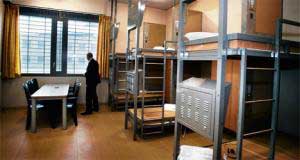The hi-tech prison in Lelystad (The Netherlands) opens, and locks, its doors to low-risk inmates this week.
In the 150-capacity prison, inmates wear electronic bracelets and are divided into cells of six – where they eat, sleep and do their own washing and cooking. The tags and touch-screen computers at the end of their beds allow them to organise their own daily schedules – with a choice of sports, recreation, personal development, education and outdoor activities.

The tag sends a signal every two seconds, so if a prisoner is not where he should be, an alarm will sound and he will lose out on credits for good behaviour. These can be used towards privileges such as extra phone calls, visiting time or the chance to swap cells.
Camera surveillance in the prison is only in public spaces. However, cells are equipped with microphones that relay information to the prison’s control centre for analysis by emotion recognition software. The software uses a combination of sound volume and rhythm to alert guards when a violent confrontation between inmates may be taking place.
“If they are watching a football match and there is a goal and they are shouting, it will not react,” says Justice ministry spokesman Hans Janssens. “But if there is an intense discussion or fight, or aggressive screaming, the system will detect this.”







